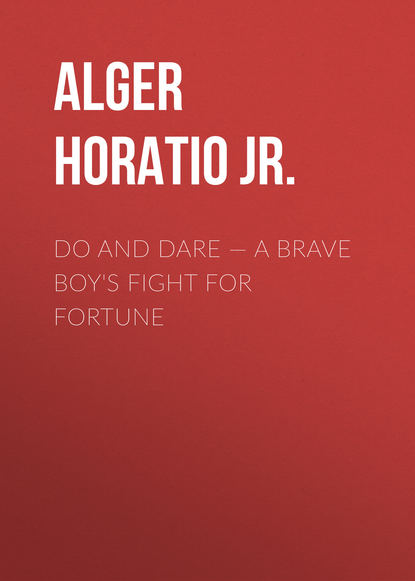По всем вопросам обращайтесь на: info@litportal.ru
(©) 2003-2025.
✖
Do and Dare — a Brave Boy's Fight for Fortune
Настройки чтения
Размер шрифта
Высота строк
Поля
“I have been talking with Mr. Melville,” said the colonel. “I am sorry to hear that he is traveling in search of health.”
“Yes, sir; I hope he will find his journey beneficial.”
“Oh, not a doubt of it! Not a doubt of it! I’ve been there myself. Do you know, when I was twenty-five, which I take to be about the age of your employer, I thought I should die of consumption?”
“I shouldn’t have supposed it, sir,” said Herbert, and Melville, too, felt surprised, as he noticed the stalwart proportions of the former consumptive.
“Ha! ha! I dare say not,” said the colonel, laughing. “I don’t look much like it now, eh?”
“No, you certainly don’t, colonel,” said Melville. “I am curious to know how you overcame the threatened danger.”
“I did what you are doing, sir; I came West.”
“But the mere coming West did not cure you, did it?”
“No, sir; it was the life I lived,” returned Col. \Varner. “I didn’t stay in the cities; I went into the wilderness. I lived in a log-cabin. I bought a horse, and rode every day. I kept in the open air, and, after a while, I found my strength returning and my chest expanding, and in a twelvemonth I could afford to laugh at doctors.”
“And you have never had a return of the old symptoms?” asked Melville, with interest.
“Never, except four years afterwards, when I went to New York and remained nearly a year. I am now fifty, and rather hale and hearty for my years, eh?”
“Decidedly so.”
“Let me advise you to follow my example, Mr. Melville.”
“It was my intention when I started West to live very much as you indicated,” said Melville. “Now that I have heard your experience, I am confirmed in my resolve.”
“Good! I am glad to hear it. When do you leave Chicago?”
“To-morrow, probably.”
“And how far West do you intend to go?”
“I have thought of Colorado.”
“Couldn’t do better. I know Colorado like a book. In fact, I own some valuable mining property there, up in—ahem! Gilpin County. By the way—I take it you are a rich man—why don’t you invest in that way? Perhaps, however, you have it in view?”
“No, I haven’t thought of it,” answered Melville. “The fact is, I am not anxious to become richer, having enough for all my present needs.”
“Just so,” said the colonel. “But you might marry.”
“Even if I did—”
“You would have money enough,” said Col. Warner, finishing the sentence for him. “Well, I am delighted to hear it. I am very well fixed myself—in fact, some of my friends call me, ha! ha!—the nabob. But, as I was saying I am rich enough and to spare, and still—you may be surprised—still I have no objection to making a little more money.”
Col. Warner nodded his head vigorously, and watched George Melville to see the effect upon him of this extraordinary statement.
“Very natural, colonel,” said Melville. “I believe most people want to be richer. Perhaps if I had vigorous health I might have the same wish. At present my chief wish is to recover my health.”
“You’ll do it, sir, you’ll do it—and in short order, too! Then you can turn your attention to money-making.”
“Perhaps so,” said Melville, with a smile.
“If not for yourself, for your young friend here,” added the colonel. “I take it he is not rich.”
“I have my fortune still to make, Col. Warner,” said Herbert, smiling.
“The easiest thing in the world out here, my boy!” said the colonel, paternally. “So you start to-morrow?” he inquired, turning to Melville.
“I think of it.”
“Egad! I’ve a great mind to accompany you,” said the colonel. “Why shouldn’t I? I’ve got through all my business in Chicago, and I like the pure air of the prairies best.”
“We shall be glad of your company, colonel,” said Melville, politely.
“Thank you, sir; that decides me. I’ll see you again and fix the hour of going, or rather I’ll conform myself to your arrangements.”
“Very well, colonel.”
“What do you think of my new acquaintance, Col. Warner, Herbert?” asked Melville when they were alone.
“He seems to have a very good opinion of himself,” answered Herbert.
“Yes, he is very well pleased with himself. He isn’t a man exactly to my taste, but he seems a representative Western man. He does not look much like a consumptive?”
“No, sir.”
“I feel an interest in him on that account,” said Melville, seriously. “If at any time I could become as strong and stalwart I would willingly surrender one-half, nay nine-tenths of my fortune. Ill health is a great drag upon a man; it largely curtails his enjoyments, and deprives him of all ambition.”
“I don’t see why his remedy wouldn’t work well in your case, Mr. Melville,” said Herbert, earnestly.
“Perhaps it may. At any rate, I feel inclined to try it. I am glad the colonel is going to travel with us, as I shall be able to question him about the details of his cure. He seems a bluff, genial fellow, and though I don’t expect to enjoy his companionship much, I hope to derive some benefit from it.”
“By the way, Mr. Melville, I met an old acquaintance while I was out walking,” said Herbert.
“Indeed!”
“Eben Graham.”
“How did he look—prosperous?”
“Hardly—he was wheeling a barrow of vegetables.”
“Did you speak with him?”
“Yes; he wanted to borrow money.”
“I am not surprised at that; I thought it time for him to be out of money. Did you lend him?”











